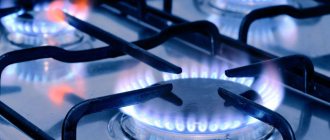Home/Water supply and sanitation/Lack of hot water
Modern man is accustomed to enjoying all the benefits of civilization. One of them is a daily uninterrupted supply of hot water. But in practice it may happen that it is absent. It’s one thing when you were warned about this, but another thing when the water was turned off suddenly, and you don’t know when it will be “returned.” In the first case, you just have to wait for the GW to appear and enjoy life, but in the second situation, you have the right to complain and seek justice.
Reasons for turning off hot water
As practice shows, repair and preventive measures in the area of the pipeline or heating plant are the causative factors for turning off hot water. Owners of real estate who use this type of housing and communal services are warned about this fact in advance through the management organization. If no such messages were received, there was probably an emergency in the water supply system. Often the reason for turning off warm water is the formation of debt on utility bills.
For your information
Currently, many buildings are far from new and therefore subject to a high degree of wear and tear. Major repairs have to wait a long time, during which pipes and other sewer systems rust and become obsolete. As corrosion develops, the water supply system loses its reliability, and various breakdowns quite often occur on the lines. To avoid such unforeseen situations, representatives of management companies take preventive measures in the summer, which require temporarily turning off hot water. Therefore, it is not surprising that she is absent at this time period.
It is common practice to turn off water during the summer months. The main reasons why this happens:
- start of planned repair work;
- reconstruction of sewerage units and systems;
- prevention of subsequent breakdowns;
- installation and replacement of equipment units;
- debt to pay utility bills.
It is generally accepted that in a number of situations, preventive shutdown of hot water supply occurs “in order to save money.” This is partly true, since depriving the population of breastfeeding for two weeks helps to save resources. But the main purpose of the events is different.
Selecting a water heater
No hot water: where to call and complain - possible causes and solutions + photos and videos
Which boiler to choose depends on many reasons. First of all, they consider the economic one, and in this regard there is no equal to a gas water heater or water heater. Therefore, if the project provides for such an opportunity, and you want to save a lot of money, choose this type.
Gas water heater Oasis
The only disadvantage of this solution is that you cannot install it yourself, since the instructions require technical conditions for connection, and a certified specialist must install the speaker.
Connecting a geyser
But gas equipment itself costs less than electric equipment, so it will pay for itself faster. If the house is not gasified or you are against the presence of gas equipment in the apartment, buy an electric water heater.
It comes in two types:
Flow-through - water is heated by passing through the heating element. It should have a good stable pressure. The advantages of such devices include small dimensions and ease of installation with your own hands. The disadvantages are high power consumption (5-27 kW), which sometimes completely cancels out the benefits of disconnecting the city network. In addition, wiring in older homes is often not designed to handle this kind of power and may not be able to handle the load.
Instantaneous water heater Termex
Accumulative - heats up a large volume of water in the tank at once. Makes it possible to regulate the temperature and maintain it at a given level. Compared to flow-through, it consumes very little electricity (1.5-3 kW), but has impressive dimensions.
Storage water heater Electrolux horizontal type
Another factor influencing the choice of a boiler is its placement in the apartment.
The easiest way is to find a place for a flow-through electric heater. It is usually installed in the kitchen at the water connection point of the kitchen sink. It is also possible to embed it into the pipeline at the entrance to the apartment to provide hot water to all water taps.
Storage and gas boilers cannot be placed in the bathroom. Therefore, the former are most often hung in the toilet, and the latter in the kitchen, at the gas pipe supply point. And from this point they make a connection into the existing hot water pipeline, or lay wiring to all devices that consume hot water.
Geyser in the kitchen
Instantaneous water heater in the cabinet under the sink
Large storage boiler in the bathroom
Normative base
General provisions for hot water supply are regulated by the housing code. But there are more specific provisions reflected within the framework of Government Resolution No. 354, adopted on May 6, 2011. It describes the procedures for providing utility services to owners of apartment buildings (MKD). Thus, the regulatory framework implies the following points:
- uninterrupted supply of hot water throughout the year;
- permissible temperature deviation parameters at night (from 0 to 5 o'clock) 5 degrees, during the day (from 5 am to 12 pm) 3 degrees;
- constant compliance of the content and properties of warm water with the norms and rules of general sanitation (this standard is established by SANPIN 2.1.4.2496-09);
- the pressure indicator in the system within the analysis point is from 0.03 MPa.
Attention
According to Decree No. 354, water can be turned off at a certain time and for a strictly regulated period:
- a total of 8 hours over 1 month;
- 4 hours as part of a one-time shutdown;
- day in emergency situations.
The duration of the break is regulated by the same SANPIN, and in its clause 3.1.11 it is noted that during annual maintenance and repairs, the shutdown cannot be more than 14 days.
Deadlines
Cold water may be turned off for different periods. Its duration depends on the nature of the suspension of water supply.
If the shutdown is planned, then the cold water supply in the house can be turned off for a total of 8 hours during the month, but no more. If the interruption in the supply of cold water is one-time, then its duration cannot exceed 4 hours. This is recorded in Appendix 1 of the Resolution under number 354.
If the cessation of water supply is unscheduled, then it must be restored within two days from the day the accident was eliminated (clause 120 of Resolution No. 354).
Read more about shutdown periods here.
Step-by-step instructions for action if there is no hot water
Many people, having opened a tap with hot water and faced with its absence, panic and begin to frantically make some decisions. First you need to calm down and act peacefully. The main thing is to understand that turning off water is not a whim of some organization or a momentary desire of the management company, but a necessity. The first step is to contact your homeowners association or management company, depending on how your property is managed. Most likely, these services will provide you with detailed information, as well as a hint where exactly you should contact.
This is not the only measure that a homeowner can take in the absence of hot water supply. If you look at your utility bill, you will be able to see contact phone numbers that you can call if there is a problem with the system. Another acceptable option is to make a call to the emergency dispatch service. Most often, her contacts “hang” among the advertisements at the entrance or inside it.
Compliance with the procedure for stopping hot water supply
Regardless of the characteristics of the debtor, the mechanism for suspending the supply of GW, like other services, is strictly regulated. Therefore, it is sometimes possible to achieve the resumption of normal service even without full payment of all costs incurred. In order to turn off water to a client, the RSO or management company must comply with all the rules governing this process. The debtor can ultimately use any significant violation to his advantage.
Firstly, measures are applied to a citizen only when a debt arises, the amount of which is equal to two monthly fees for utility services. In this case, the monthly amount is calculated according to current consumption standards, and not according to data from individual metering devices. When sufficient debt has accumulated, the provider must first send a notice to the subscriber and warn that if bills are not paid within 20 days, service will first be limited and then terminated. The form of the warning is not particularly important - it is allowed to send a registered or email letter, issue a receipt with a note about upcoming enforcement measures, SMS, a message via a telephone call with a recording, or posting information in the consumer’s personal account in the state housing and communal services system.
Important! Fundamental requirement: regardless of the chosen notification method, utility companies must receive confirmation that the addressee has read the information intended for him. Otherwise, any subsequent actions of the services will be regarded as unlawful
Secondly, if a citizen has not paid his bills within 20 days from the moment he received the warning, then the supplier introduces a limited consumption regime. For example, hot water supply can be supplied according to a special schedule - several hours a day. But the restriction applies only when it is technically possible, and only for 10 days. After this, the tenant either transfers the required amount or is left without hot water.
Who to call if there is no hot water?
Pipelines supplying hot water often face enormous loads, so organizations responsible for this process are forced to constantly carry out scheduled maintenance work. If the shutdown of hot water is planned, and you were notified about it in advance, there is no need to call anywhere. The water will appear in a maximum of 2 weeks, and everything will be decided. You won't achieve anything by calling, because these services won't be able to supply hot water anyway.
Attention
If the outage happened suddenly, you should contact the emergency service, providing your address and personal information. The dispatcher undertakes to provide his name, tell the calling party about the reason for the outage and the stage of work to eliminate the emergency. Be sure to inquire about the time of planned completion of work and the expected time of resumption of water supply. If the dispatcher is unable to provide the necessary information, call the housing inspectorate or the city water utility.
Where to call in Moscow if there is no warm water?
To ensure their own safety, every Moscow resident must obtain several numbers belonging to emergency public services. If the hot water supply is turned off in the capital, you must first contact MOEK. Here are a few more numbers you can call if you encounter a similar problem:
- +7 – this is a “hotline” phone number that can be reached around the clock if there are interruptions in the supply or a complete lack of water (office address is Efremova St., 10);
- +7 , as well as 681 20 54 and number 681 21 45 - these numbers are used if there is a need to complain about the poor quality of the heating options (this is the hotline of the Moscow Housing Inspectorate, which can be reached around the clock);
- + – the number is always available, and you can call it in case of emergency work (the organization is called MOSVODOSTOK).
IMPORTANT
These phone numbers should be considered the most important, and if hot water is turned off in Moscow, you can call them to clarify the details. The client should remember that all utilities are committed to providing them with high-quality services, because residents pay the full rate for this.
What to do if hot water is cold
Sometimes situations arise when the water from a “hot” tap is lukewarm. It is necessary to tell the management company about this and call its employee to your home if necessary. He will take fluid measurements and draw up a report. If indicators were obtained that differ markedly from the established standard, then the legal requirements to reduce fees in accordance with other tariffs established by law come into force.
If after your call everything remains in its place, but the hot water still does not flow, you need to contact the housing inspectorate that regulates affairs in your region. Typically, such authorities immediately respond to such requests, and also influence employees of management companies by issuing a fine, filing a case with the courts, revoking permission, etc. In addition, the owner of the property can contact the prosecutor’s office, which most often makes decisions in favor of citizens.
To the housing inspection
GZHI controls the activities of enterprises in the field of housing and communal services. Unfair performance of work by the water utility is a direct violation of contractual obligations, in some cases – non-compliance with the rights of citizens. If complaints to previous authorities remain without a positive response, you can complain to the Housing Authority. To do this, draw up an appeal according to a standard template and deliver it in person or by mail.
IMPORTANT! State authorities accept complaints on their official websites, as well as through online resources - State Services and RosZhKKH. There you can also see a sample, an example and receive a claim form.
When can I recalculate hot water?
According to the general norms of legislation (Resolution No. 354), conversion operations for payment of GW can be carried out in a number of situations.
- For each hour in which the permissible duration of the supply interruption was exceeded. In this case, the calculation is made in the amount for the estimated time in which the excess occurred. The amount of the fee is subject to reduction by 0.15% of the amount determined for the same period.
- For every 3 degrees of temperature error (deviation from the norm). In this case, the payment amount is reduced by 0.1% of the amount determined for this billing period. If the temperature at the point of analysis is below 40 degrees, payment for each hour is made as for cold water.
- In case of non-compliance of the composition and properties of HS with the requirements of Russian legislation related to technical regulation. The amount is reduced by the amount of the fee calculated for each day of provision of poor-quality service.
- For each hourly period of hot water supply in total during the billing period in which the pressure deviation occurred. If the error is less than 25%, there is a decrease of 0.1% per hour. If it differs by more than 25%, the amount is subject to reduction by the amount of the fee calculated for each day of provision of inadequate quality service.
Step-by-step instructions for completing a recalculation
If hot water is unavailable for a long time or is of insufficiently good quality or does not meet current sanitation standards, the accounting department of the management company carries out recalculation measures. This requires examination of the fact of violation of the legislation on hot water supply. The homeowner contacts the water utility and asks for a complaint registration number. This will act as evidence in court proceedings.
Attention
After receiving the registration data number about the complaint, a statement is written to the management company. It is within the authority of this organization that the payment for hot water supply is recalculated. If representatives of the water utility are aware of the events that caused the lack of hot water, they report this by phone. If not, then they have to go to the place to clarify the circumstances. If the fact of lack of hot water is confirmed, tariffs are reduced according to consumption standards. Recalculation is not carried out in the absence of water, which does not imply exceeding the legal time frame.
How to write a complaint
Let's look at the rules for drawing up using the example of the administration and the prosecutor's office:
- The header indicates the name of the prosecutor's office or the full name of the head of the administration.
- Next, the applicant writes his full name and address.
- Then follows the name of the document - Complaint.
- The main part contains a detailed description of the essence of the conflict: how the water utility violates the rights of citizens, what work it has not completed. It is necessary to indicate the actions that were taken to resolve the dispute independently, and which authorities have already been contacted.
- At the end, the date of preparation of the document and signature are indicated.
- The attachment will include correspondence with the organization, other authorities, photographic materials, and testimony.
Nuances of action
- Do not rush to immediately file a complaint and call higher authorities. Turning off hot water is a common procedure in apartment buildings.
- The first one who is responsible for non-provision or poor quality of services is the management company. It can be influenced by higher authorities.
- If actions to disconnect the hot water supply are illegal, it is necessary to file a complaint, make a recalculation and demand compensation for losses from the guilty party, as well as the imposition of an administrative fine on it.
Comments Showing 0 of 0










